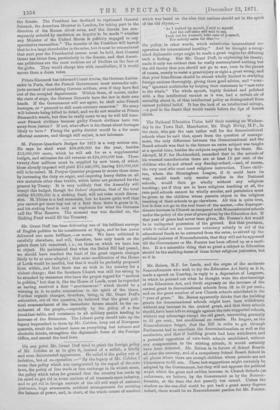On one point Mr. Grant Duff tried to paint the
foreign policy of Mr. Cobden so as to give it, instead of a selfish, a kindly and even disinterested appearance. He called it the policy not of isolation, but of co-operation :—" By the legacy of Mr. Cobden I mean that policy which was inaugurated by the repeal of the corn laws, the policy of free trade or free exchange in its widest sense, the policy which takes for granted that the country has made up its mind to get rid in home matters of all trammels upon industry, and to get rid in foreign matters of the old evil ways of national jealousies, huge armaments, artificial arrangements for securing the balance of power, and, in short, of the whole course of conduct which was based on the idea that nations should act in the spirit of the old rhyme,—
' As I walked by myself, I said to myself, And the self-same self said to me,
Look out for yourself, take care of yourself, For nobody cares for thee,'—
the policy, in other words, which substitutes international co- operation for international hostility." And he thought a recog- nized diplomatic corps might be made a great engine for diffusing such a feeling. But Mr. Grant Duff, in explaining his theory, made it only too evident that he really contemplated nothing but the old theory that you should not go to war, even in the purest of causes, merely to resist a great injury or right a great wrong, and that your friendliness should be almost wholly limited to studying foreign nations thoroughly, giving them good advice, and " coax- ing " ignorant multitudes by helping their statesmen to " cast tuba to the whale." The whole speech, highly finished and polished with a fine intellectual varnish as it was, had a certain air of unreality about it, of thin intellectual policy as distinguished from earnest political belief. It has the look of an intellectual mirage,
—a pool in the desert that would vanish before the lips of honest thirst.










































 Previous page
Previous page